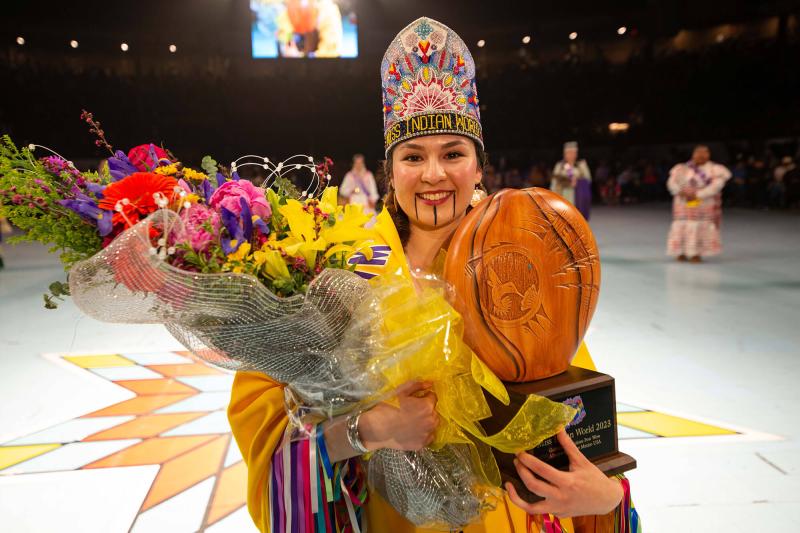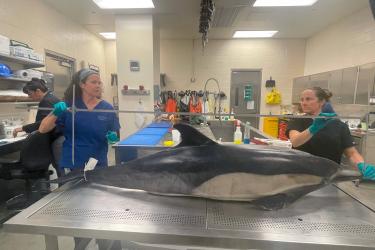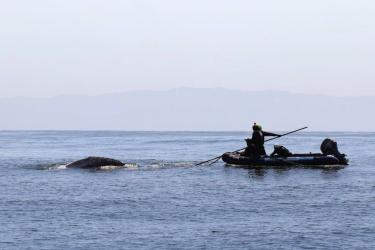In the first weeks of the Covid pandemic in 2020, Tori McConnell took on an assignment for her environmental law class at the University of California, Davis. As she started sketching with colored pencils, an image “just came out of me,” she recalled. “I did not put a lot of thought into it. It came together in a magical way.”
The picture that took shape reflected the “undamming of the Klamath River.” At the time, a long-debated proposal to remove outdated dams from the river was beginning to move forward. The Klamath River had once provided her Yurok Tribe with an unending supply of wild West Coast salmon. “The piece is not 100 percent my work,” she recalled. “The truth is it’s more like a gift that I received. I just happened to be the one to draw it.”
Her sketch revealed a young local native woman against a backdrop of mountains. Tears stream down her face from beneath ceremonial blinders that reflect her inner transition from a girl into a woman. The tears fill two woven Yurok baskets that she balances “like an indigenous Lady Justice,” McConnell explained. The baskets overflow, pouring water over gray concrete walls into a roaring river full of salmon.
Sharing Culture with the World
The image that came to McConnell like a gift is now coming to life as the largest salmon recovery effort ever on the West Coast. Four of the Klamath dams are coming down just as McConnell herself holds the title of Miss Indian World. She serves as a tribal ambassador representing the Gathering of Nations Powwow and Native American, indigenous, and First Nations cultures to the world. She is the first-ever Yurok and the first member of a California tribe in 14 years to hold the role.
The alignment of her reign with the dam removals is fitting. The Yurok Tribe suffered mightily from the damming of the Klamath River but always remembered the salmon they are now helping to bring back. NOAA Fisheries is supporting the dam removals with science and funding for river restoration once the dams come down. We connected with McConnell on the occasion of Native American Heritage Month to hear more about the role of salmon in her life as a Yurok.
The Yurok Tribe had access to salmon even with the dams in place because the fish could still spawn in the river below the dams. However, reopening the entire Klamath River to salmon will greatly increase their reach, numbers, and resilience.
McConnell entered the competition for Miss Indian World after meeting her first teacher’s assistant at UC Davis, Jessa Rae Growing Thunder, who had held the title and inspired her upcoming journey. After graduating from UC Davis and moving home, McConnell was selected through a competitive pageant in April that included public speaking, traditional dance, writing, and a traditional talent, which for her was basket weaving, the Karuk language, her Undamming artwork, and traditional singing. Besides her current reign, she is seeking her master’s degree in Environment and Community at Cal Poly Humboldt.
The following recounts our conversation, and is edited for clarity:
What is the balance reflected by Indigenous Lady Justice in your artwork?
We understand that the balance of the world is our responsibility. It’s kind of in our hands, too. We are holding the balance. Our purpose here on earth is to uphold the balance—to maintain the balance. Whenever something starts tipping a certain way, it’s our responsibility to add energy to that situation to tip it back so the cycles and systems of our natural world can continue.
What role did salmon have in your life growing up as a Yurok?
I really had no idea how special salmon was at the time, because for me that was normal. That was just our family’s everyday way of life. Salmon were always part of it. I was always proud of it, but now that I am older, I can be even more proud of it, and more thankful and learn more deeply what it means. Then I apply those lessons of what I am learning from this relationship into other areas of the real world and real life as an adult, as an advocate, and representative.
I want everyone to be able to have such a strong relationship, a strong connection to at least some aspect of their food ways. Food is where we come from and how we sustain life. Water is, too.
Sadly, our food system doesn’t give us that opportunity. With a transactional experience to obtain your food, you don’t get to understand as much about where it came from and its place in the world and your place in the world in relation to it.
Why is it important for salmon to again swim up the Klamath River?
The feelings that we get when we smell these plants and go to these places—those feelings that we have, tell us about how to interact with the world. It reawakens the memory and it overcomes all the damage that has been done to us historically. Yes, the damage was great and it is great and we suffered from it. Everyone suffers, not just us. Even the settler colonial society has suffered from the damage that has been done to indigenous peoples. Even though that damage was so great, that relationship and the feelings we have for these places today overcome all that damage. They are greater than that. That is one of the reasons why it’s important to continue fighting for the salmon, because they have taught us how to live. Our relationship continues to tell us how to live sustainably, responsibly, and in a healthy way.
I am from this beautiful place that is very unique and connected to many plants and animals and places that are very special. The connection goes beyond my lifetime. It’s something that is ingrained into the way my senses perceive the world and how my spirit is inextricably entangled with the water and the rocks and the willow trees and the salmon and the deer and the way that the air smells or the way it feels when you’re up on a mountain. All those things are not just for myself as a Yurok person, but for anybody from this area. These are things we remember from a long time ago, even from the beginning of human time as we know it.
What is the role of salmon in Yurok culture?
These places have made me into the expression of a person that I am today. That goes for salmon, too, because our people are really known for our art. Salmon always gave us the physical and mental strength to carry out these arts. We are renowned around the world for basketry and regalia and contemporary art. I have been taught that a big reason we have these amazing arts that cannot be found anywhere else is that we have a distinct style and a connection with the material that we use. These things are a gift from the spirits and they are a gift from the land.
Not only are we making these things like traditional regalia or traditional basketry out of materials from the land, but we are also making them and have made them using the energy derived from our ancestral foods like salmon and lamprey eels and sturgeon and different kinds of berries and nuts, different kinds of greens, elk, and seafood on the coast. So our art and our expressions of who we are have been entirely made possible because of these foods we have eaten.
Salmon is an amazing source of nutrients for us. Without it we wouldn’t have had the brainpower or the physical power to create and maintain and preserve the beautiful culture that we see today. For salmon people, our identity, the cultural resources, and our culture itself as a resource are entirely dependent on our relationship to salmon and relationship to water and the cycles that reproduce the ecological systems that sustain themselves and sustain us. This web of interdependence and ecology has allowed us to be here.
What would it mean to have healthy salmon populations again?
I can’t really imagine a life without salmon. We catch it out of the river. We preserve it in different ways. We smoke it and we can it. Just going to the river during the fishing season was a grounding thing and it was exciting. It was fun hanging out with other kids at fish camp. It also made me really proud as a kid because I knew where I came from. There were a lot of things I didn’t know about my culture growing up. There were a lot of things I had to work really hard to learn, but salmon was always there. I felt like that was really important for me because I had to work on the languages or work on my connection to ceremony or the community.
Salmon was something that was passed down directly from my parents because my parents’ grandparents are boarding school survivors, all of them. There are things that were eliminated like the language and certain aspects of culture. But for some reason the thing that survived is the salmon. That is the foundation of who we are because that is what our bodies are made of. That is how we exist in this three-dimensional reality in this human body as a biological organism. That is what our DNA has used to repair itself. I am very grateful for that and that our connection with the salmon survived. It helped us get through all that. Now that we’re through the more traumatic parts of our recent history, we have the inner resources and the inner knowledge to work on healing the other things we have lost.





